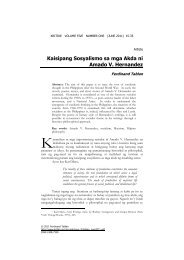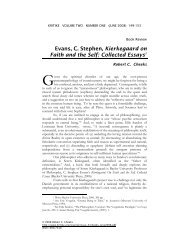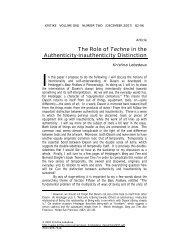The Paradox of Ipseity and Difference: Derrida's Deconstruction and ...
The Paradox of Ipseity and Difference: Derrida's Deconstruction and ...
The Paradox of Ipseity and Difference: Derrida's Deconstruction and ...
You also want an ePaper? Increase the reach of your titles
YUMPU automatically turns print PDFs into web optimized ePapers that Google loves.
R. PADA 45<br />
<strong>The</strong> Differing <strong>Difference</strong> <strong>of</strong> <strong>Ipseity</strong><br />
In seeking the center in which deconstruction tries to unsettle, one<br />
finds that the answer lies on Derrida’s notion <strong>of</strong> difference or, specifically,<br />
différance. Différance is the ontology <strong>of</strong> ipseity <strong>and</strong> difference that explains the entire<br />
activity <strong>of</strong> the repetition in which logocentrism is used as an eccentric center. <strong>The</strong><br />
intention <strong>of</strong> this neologism is to show the function <strong>of</strong> ipseity <strong>and</strong> difference under<br />
one singular activity in which meaning is transferred <strong>and</strong> inscribed. As I have<br />
stated earlier, this neologism is a movement away from the original towards the<br />
Other, while at the same time retaining its old self. This neologism itself is<br />
based on various philosophemes <strong>and</strong> even psychoanalytic themes that express<br />
the simultaneous activity <strong>of</strong> ipseity <strong>and</strong> difference. Derrida would, for example,<br />
refer to Nietzsche in terms <strong>of</strong> his writing style, as an activity <strong>of</strong> moving against<br />
the different forces that has controlled or even dominated metaphysical<br />
grammar, without ab<strong>and</strong>oning the very language in which these forces imposes<br />
upon philosophical discourse. 44 Freud, also, was used as an example <strong>of</strong> how the<br />
ego, in its instinct for self-preservation, moves into reality without ab<strong>and</strong>oning<br />
the intentions <strong>of</strong> the ego <strong>of</strong> obtaining pleasure for itself, thus retaining its<br />
selfhood <strong>and</strong> at the same time moving towards others as its means <strong>of</strong> acquiring<br />
pleasure 45 [Jouissance]. Derrida would even go as far as using différance as an<br />
explanation <strong>of</strong> how the consciousness <strong>of</strong> the self in Hegel engages in a dialectical<br />
encounter with its other to obtain its own self-consciousness through sublation or<br />
Aufhebung [or in French, as Derrida would translate, la reléve]. 46 <strong>The</strong> most<br />
common <strong>and</strong> obvious example, however, is his alteration <strong>of</strong> the word différence<br />
to différance. 47<br />
<strong>The</strong> difference in spelling is a blatant defiance <strong>of</strong> Saussurean<br />
linguistics, wherein the valorization <strong>of</strong> speech over writing is done due to the<br />
immediacy <strong>of</strong> speech over writing, which Saussure finds important primarily<br />
because <strong>of</strong> the semiotic capability <strong>of</strong> speech to phonetically distinguish one word<br />
from another. 48 To put Saussure’s claim into irony (which Derrida takes<br />
seriously), Derrida’s modification <strong>of</strong> the letter e in différence provides a mockery<br />
<strong>of</strong> Saussure’s position that words are distinguished from one another<br />
phonetically, for in its pronunciation, différance, does not have any phonetic<br />
difference from différence. 49 What is notable about this demonstration <strong>of</strong> the<br />
44 Derrida, Margins <strong>of</strong> Philosophy, 18.<br />
45 Ibid., 19.<br />
46 Ibid.<br />
47 Ibid., 3-4.<br />
48 Ferdin<strong>and</strong> de Saussure, Course in General Linguistics, trans. by R. Harris, ed. C. Bally<br />
<strong>and</strong> A. Schehaye (Illinois: Open Court Publishing Company, 1983), 23-24.<br />
49 “. . . But I would say that this in itself – the silence that functions within only a socalled<br />
phonetic writing – quite opportunely conveys or reminds us that, contrary to a very<br />
widespread prejudice, there is no phonetic writing… from this point <strong>of</strong> view, that the difference<br />
marked in the “differ( )nce” between the e <strong>and</strong> the a eludes both vision <strong>and</strong> hearing perhaps<br />
happily suggests that here we must be permitted to refer to an order which no longer belongs to<br />
sensibility. But neither can it belong to intelligibility, to the ideality which is not fortuitously<br />
affiliated with the objectivity <strong>of</strong> theôrein or underst<strong>and</strong>ing. <strong>The</strong> order that resists the opposition,
















